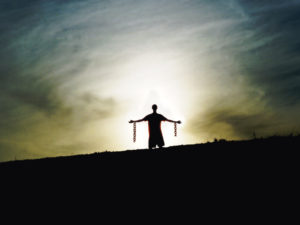 Jesus and his disciples arrived at the country of the Gerasenes… As Jesus stepped out on land, a man of the city who had demons met him. For a long time the man had worn no clothes, and he did not live in a house but in the tombs. When he saw Jesus, he fell down before him and shouted at the top of his voice, “What have you to do with me, Jesus, Son of the Most High God? I beg you, do not torment me” – for Jesus had commanded the unclean spirit to come out of the man. (For many times it had seized him; he was kept under guard and bound with chains and shackles, but he would break the bonds and be driven by the demon into the wilds.) Jesus then asked him, “What is your name?” He said, “Legion”; for many demons had entered him. Luke 8:26-39
Jesus and his disciples arrived at the country of the Gerasenes… As Jesus stepped out on land, a man of the city who had demons met him. For a long time the man had worn no clothes, and he did not live in a house but in the tombs. When he saw Jesus, he fell down before him and shouted at the top of his voice, “What have you to do with me, Jesus, Son of the Most High God? I beg you, do not torment me” – for Jesus had commanded the unclean spirit to come out of the man. (For many times it had seized him; he was kept under guard and bound with chains and shackles, but he would break the bonds and be driven by the demon into the wilds.) Jesus then asked him, “What is your name?” He said, “Legion”; for many demons had entered him. Luke 8:26-39
This summer we are reading through the Gospel of Luke; Sunday by Sunday we’ve heard about all the people who came to Jesus for healing. Some of those healed were Jews, and others were Gentiles; some followed the Jewish law, other Jews were called ‘sinners’ because they didn’t follow the law perfectly. Everyone who came to Jesus, each person who was healed, was different – and Jesus responded to each one as a unique individual.
But there is one thread that unites all the stories, and that is the compassion of Jesus. Jesus didn’t seem to care if someone was Jewish or Gentile, male or female, rich or homeless, law-abiding or lawbreaker. Sometimes breaking the law himself, Jesus reached out and touched them, and they were healed.
The man Jesus meets in today’s Gospel was a Gentile. He was not only mentally tormented by his ‘demons’, but he had been cast out by his village because his people couldn’t deal with those demons either. And so he was homeless, wandering the hills in the daytime and sleeping in the caves at night.
(Today we might have a name for the man’s illness – schizophrenia – and even some medications to control it; but – let’s be honest – a person with mental illness is still likely to be homeless and cast away by our society. We still have little tolerance for people who disrupt our lives, and too often we lose compassion for people who need unending help, people we don’t know how to help, people who are just too different from the rest of us.)
So it’s not just sick people who need to be healed; sick communities need to be healed – families, communities, schools, churches, and societies – all groups that exile, exclude, push away, treat violently, or simply refuse to deal with troublesome people.
Beyond noticing Jesus’ compassion, we should also pay attention to what he said to this man: “What is your name?” And the man answered, “Legion” – because he felt so many troubling spirits warring within him.
Before he could heal this man, Jesus wanted the man to identify his illness, to give a name to what was hurting.
This week, once again, we have been reminded that we live in a society with many sick people – and we’ve been reminded again that our society itself is sick.
This week, once again, pundits and politicians have tried to give the sickness a name – it’s mental illness, it’s guns, it’s radical religion, it’s sexual orientation. So perhaps Americans can identify with this homeless man screaming from the tombs. Our problems – like his – are “legion”.
Like the man who lived so long ago in the country of the Gerasenes, our country doesn’t just have one problem, but too many problems to count.
What in each of us needs to be healed? And what in our society needs to be healed?
In response to the shootings in Orlando last weekend, our Bishop, Mary Gray Reeves, wrote to the Diocese of El Camino Real on Friday,
I have asked the question a lot lately, “How do our values translate into action?” It is a question that arises during the defining moments that inevitably come our way in life; those events that are transforming to the point where we are confronted with who we are, what we believe, and how we live out our values in the world. Our values can be clarified, strengthened and empowered as a result of having to wrestle with ourselves.
I was ticketed for speeding a few months ago. I clearly had decided that my right to drive beyond the speed limit on an unpopulated road was more important than the reason the speed limit in that location was determined in the first place. I slogged through traffic school and repeatedly, the obvious was stated: laws were in place to keep us from harming ourselves and others.
It puzzles me – it terrifies me – that we can place limits on how we use a cell phone in a car to save lives, but cannot freely and willingly work toward boundaries to lessen the capacity of another to exercise deadly rage.
How will our values be clarified, strengthened and empowered because of Orlando? Because of God’s beloved listed [in today’s prayers]? We don’t know all the details yet of the shooter’s disposition. He could have been an Islamist terrorist or a GLBTQ terrorist. He was plagued in some way and disposed toward raging violence. It is our reality that people are in our midst who will do such things.
Such events call us to consider our responsibility to one another. For me, questions arise. Is my right to bear certain weapons of more value than those who died? Is the lack of social responsibility taken in this country for the mentally ill of more value than those who died? None of us are free from guilt in these events. As citizens and residents in these United States, as Christians, each mass shooting says something about who we are. What are the words we would use to describe ourselves in these days?
In our gospel for [today], the story of the Geresene Demoniac, I have wondered how long the conversation goes on between Jesus and the demons who inhabit the man. He was plagued for so many years. This one is complex. They aren’t leaving without a fight. A strategy must be organized. Where will the demons go? Where will the man go? This was not a quick, “drive-by” healing. It would take some time.
I was struck that at the end of the story Jesus tells the man to thank GOD for what God has done for him, but instead, he proclaims what Jesus has done for him. I think the distinction speaks of the power of the incarnation; that God was known in who Jesus was and what he did. For we who follow Jesus, it reminds us that God is known in who WE are and what we do.
I wonder if perhaps the man was so grateful that Jesus did not leave when it became apparent that the conversation would be complex and take time. There was nothing more important to Jesus in this moment than this “demoniac.” Perhaps this gentle, healed soul was so deeply thankful that Jesus stayed and kept working at it until the work was done. Jesus stays through his terror.
How might we walk alongside our bereaved families and our traumatized nation? Can we stay in these long conversations as we sort through polarized viewpoints? Can we find common ground for our values that can translate into life and goodness for us all?
Several weeks ago we held a diocesan conference on Living Room Conversations: how to have constructive conversation to find common ground on difficult issues. Gun Control, Racism, Homophobia, Sexism, Misogyny and Health Care are a few matters on which we disagree in this nation, reflected in the Orlando terror. I strongly encourage our congregations to use the Living Room Conversation process to engage in the Christian stewardship of relationship and conversation.
Mass shootings offer us an opportunity not only for more arguing, but for reconciliation and grace. Which will we choose? We struggle with our differences, and yet it is precisely in our differences that we can find creative solutions.
Please know that I am aware of my own bias and values in these and other pieces I have written following mass shootings. Part of my call as a bishop is to share what I think, and also to teach. However, my role as a gatherer is equally important. I hope that the Living Room Conversation process can provide us space to talk about difficult topics together as the Body of Christ despite disagreement. [Please take one of the blue sheets in the back of the church….]
Confident in the grace of God, may we consider one another’s views and discern our role in creating solutions that value the dignity of all human life.
O God, as the Body of Christ, may we remain with one another and with the angry, traumatized and broken heart of our nation. As we seek justice and change that reflects your will, may we trust one another as we responsibly speak our values,so that in faith, the ground from which we act in the world, we may take our placein your powerful and healing presence intended for all. It is in the power of the Spirit we humbly pray. Amen.
For more information, visit www.livingroomconversations.org. You can also support the OneOrlando Fund, announced by the city’s mayor to respond to the Pulse tragedy, at https://www.oneorlando.org/


